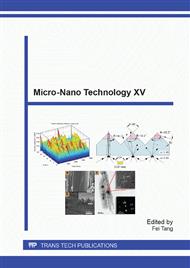[1]
Robinson Tim, McMullan Geoff, Marchant Roger, and Nigam Poonam, Remediation of dyes in textile effluent: a critical review on current treatment technologies with a proposed alternative, Bioresource Technology, 2001. 77(3): 247-255.
DOI: 10.1016/s0960-8524(00)00080-8
Google Scholar
[2]
Platzek T., Lang C., Grohmann G., Gi U. S., and Baltes W., Formation of a carcinogenic aromatic amine from an azo dye by human skin bacteria in vitro, Human & Experimental Toxicology, 1999. 18(9): 552-559.
DOI: 10.1191/096032799678845061
Google Scholar
[3]
Oros Gyula, Cserhati Tibor, and Forgacs Esther, Strength and selectivity of the fungicidal effect of diazobenzene dyes, Fresenius Environmental Bulletin, 2001. 10(3): 319-322.
Google Scholar
[4]
Tsuda Shuji, Murakami Makiko, Matsusaka Naonori, Kano Kiyoshi, Taniguchi Kazuyuki, and Sasaki Yu F., DNA Damage Induced by Red Food Dyes Orally Administered to Pregnant and Male Mice, Toxicological Sciences, 2001. 61(1): 92-99.
DOI: 10.1093/toxsci/61.1.92
Google Scholar
[5]
Ahmad A. and Jeffery C. S., Physical parameters of helium-rich subdwarf B stars from medium resolution optical spectroscopy, A&A, 2003. 402(1): 335-342.
DOI: 10.1051/0004-6361:20030233
Google Scholar
[6]
Mala R. and Saravana Babu S., Comparative seed germination tests using three plant species for toxicity assessment of textile dyeing effluent, Journal of Industrial Pollution Control, 2005. 21(2): 315-320.
Google Scholar
[7]
Sharma K. P., Sharma S., Sharma Subhasini, Singh P. K., Kumar S., Grover R., and Sharma P. K., A comparative study on characterization of textile wastewaters (untreated and treated) toxicity by chemical and biological tests, Chemosphere, 2007. 69(1): 48-54.
DOI: 10.1016/j.chemosphere.2007.04.086
Google Scholar
[8]
Ulson De Souza Selene Maria Arruda Guelli, Forgiarini Eliane, and Ulson De Souza Antonio Augusto, Toxicity of textile dyes and their degradation by the enzyme horseradish peroxidase (HRP), Journal of Hazardous Materials, 2007. 147(3): 1073-1078.
DOI: 10.1016/j.jhazmat.2007.06.003
Google Scholar
[9]
Montero Gerardo A., Smith Carl B., Hendrix Walter A., and Butcher Donald L., Supercritical Fluid Technology in Textile Processing: An Overview, Industrial & Engineering Chemistry Research, 2000. 39(12): 4806-4812.
DOI: 10.1021/ie0002475
Google Scholar
[10]
Forgacs Esther, Cserhati Tibor, and Oros Gyula, Removal of synthetic dyes from wastewaters: a review, Environment International, 2004. 30(7): 953-971.
DOI: 10.1016/j.envint.2004.02.001
Google Scholar
[11]
Pirkanniemi K. and Sillanpaa M., Heterogeneous water phase catalysis as an environmental application: a review, Chemosphere, 2002. 48(10): 1047-1060.
DOI: 10.1016/s0045-6535(02)00168-6
Google Scholar
[12]
Lucas Marco S. and Peres Jose A., Decolorization of the azo dye Reactive Black 5 by Fenton and photo-Fenton oxidation, Dyes and Pigments, 2006. 71(3): 236-244.
DOI: 10.1016/j.dyepig.2005.07.007
Google Scholar
[13]
Destaillats Hugo, Colussi A. J., Joseph Jiju M., and Hoffmann Michael R., Synergistic Effects of Sonolysis Combined with Ozonolysis for the Oxidation of Azobenzene and Methyl Orange, The Journal of Physical Chemistry A, 2000. 104(39): 8930-8935.
DOI: 10.1021/jp001415+
Google Scholar
[14]
Ince Nilsun H., Critical, effect of hydrogen peroxide in photochemical dye degradation, Water Research, 1999. 33(4): 1080-1084.
DOI: 10.1016/s0043-1354(98)00295-4
Google Scholar
[15]
Rauf M. A. and Ashraf S. Salman, Fundamental principles and application of heterogeneous photocatalytic degradation of dyes in solution, Chemical Engineering Journal, 2009. 151(1-3): 10-18.
DOI: 10.1016/j.cej.2009.02.026
Google Scholar
[16]
Aleboyeh A., Aleboyeh H., and Moussa Y., Critical, effect of hydrogen peroxide in photochemical oxidative decolorization of dyes: Acid Orange 8, Acid Blue 74 and Methyl Orange, Dyes and Pigments, 2003. 57(1): 67-75.
DOI: 10.1016/s0143-7208(03)00010-x
Google Scholar
[17]
Goel Mukesh, Hongqiang Hu, Mujumdar Arun S., and Ray Madhumita Bhowmick, Sonochemical decomposition of volatile and non-volatile organic compounds - a comparative study, Water Research, 2004. 38(19): 4247-4261.
DOI: 10.1016/j.watres.2004.08.008
Google Scholar
[18]
Aleboyeh Azam, Moussa Yasser, and Aleboyeh Hamid, The effect of operational parameters on UV/H2O2 decolourisation of Acid Blue 74, Dyes and Pigments, 2005. 66(2): 129-134.
DOI: 10.1016/j.dyepig.2004.09.008
Google Scholar
[19]
Wojnarovits Laszlo and Takacs Erzsebet, Irradiation treatment of azo dye containing wastewater: An overview, Radiation Physics and Chemistry, 2008. 77(3): 225-244.
DOI: 10.1016/j.radphyschem.2007.05.003
Google Scholar
[20]
Muruganandham M. and Swaminathan M., TiO2 - UV photocatalytic oxidation of Reactive Yellow 14: Effect of operational parameters, Journal of Hazardous Materials, 2006. 135(1-3): 78-86.
DOI: 10.1016/j.jhazmat.2005.11.022
Google Scholar
[21]
Bouasla Chafia, Samar Mohamed El-Hadi, and Ismail Fadhel, Degradation of methyl violet 6B dye by the Fenton process, Desalination, 2010. 254(1-3): 35-41.
DOI: 10.1016/j.desal.2009.12.017
Google Scholar
[22]
Lofrano Giusy, Rizzo Luigi, Grassi Mariangela, and Belgiorno Vincenzo, Advanced oxidation of catechol: A comparison among photocatalysis, Fenton and photo-Fenton processes, Desalination, 2009. 249(2): 878-883.
DOI: 10.1016/j.desal.2009.02.068
Google Scholar
[23]
Aleksic Maja, Kusic Hrvoje, Koprivanac Natalija, Leszczynska Danuta, and Bozic Ana Loncaric, Heterogeneous Fenton type processes for the degradation of organic dye pollutant in water - The application of zeolite assisted AOPs, Desalination, 2010. 257(1-3): 22-29.
DOI: 10.1016/j.desal.2010.03.016
Google Scholar


